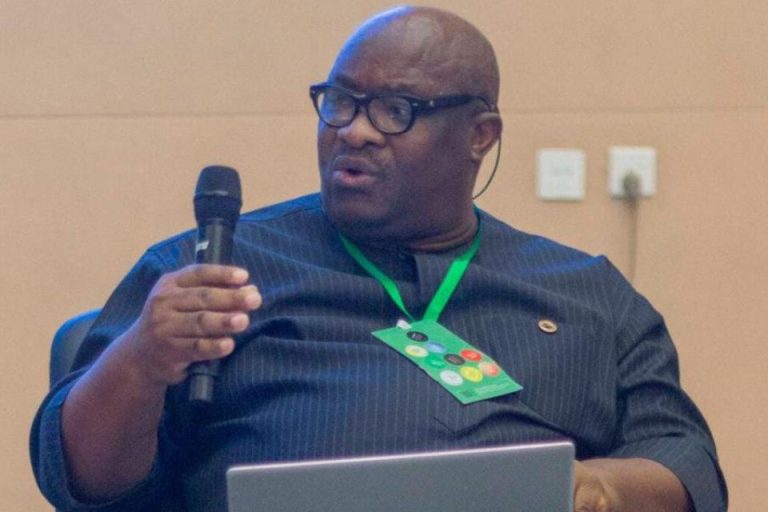The Executive Director of Media Rights Agenda (MRA), Mr. Edetaen Ojo, has called for the adoption of a regional instrument in West Africa and national laws to discourage the increasing trend by governments, public institutions and other powerful entities to file lawsuits that are merely designed to intimidate or silence journalists, non-governmental organisations and critics, popularly known as strategic lawsuits against public participation (SLAPPs).
Speaking on “Building Resilience and Regional Solidarity” at a webinar on “Silencing Expression: Legal Threats against Journalists and Activists in West Africa”, organised by the Accra-based Media Foundation for West Africa (MFWA) in Ghana and held on August 13, 2025, Mr. Ojo noted that the objective of SLAPPs is usually to intimidate, exhaust, and silence critics rather than a legitimate desire to obtain legal relief, adding that such litigation apparently “obstructs public interest journalism.”
According to him, even if such cases are ultimately dismissed, the time, expenses, reputational damage, and the sheer emotional toll that they exact on defendants can lead many journalists and activists to completely avoid public interest journalism or commenting on the activities of such wealthy individuals or organisations, since they lack the resources to effectively defend themselves.
Mr. Ojo argued that it is necessary to build effective responses that will blunt or mitigate such a “very insidious tool” and stressed that a single approach would not be sufficiently effective to provide the desired relief for the media, non-governmental organisations and other actors in society that are usually the targets of SLAPPs.
He there proposed a multi-pronged regional strategy with different elements, including legal and policy reforms, the institution of an Emergency Legal Response Fund to support defendants, capacity-building for journalists and media houses to improve their understanding of the issue and their preparedness to respond, and the facilitation of cross-border cooperation and solidarity among journalists and the media.
Mr. Ojo argued that SLAPPs exploit weaknesses in legal systems to prey on resource-constrained individuals and organisations, and as such, the legal systems of countries in the region should be reformed specifically through the “adoption of laws, regulations or policies that enable effective push back.”
According to him, the elements of such frameworks would include the possibility for seeking early dismissal of suits that target public interest journalism or public participation and shifting the responsibility for paying the legal expenses of the defendant to the person or entity that sued but lost.
Saying that the proposal is not a novel idea, Mr. Ojo pointed out that many countries in Europe and other countries like Canada, Australia and some States in the United States have already adopted such anti-SLAPP laws in an effort to protect freedom of expression.
He said although there are variations in such laws in different countries, they usually allow a defendant to file a motion to dismiss a SLAPP suit at an early stage on the grounds that the matter involves protected speech on a matter of public interest and that if the case is accordingly dismissed, the plaintiff bears the legal costs of the defendant and may also ordered to pay a penalty in the form of damages for bringing the case.
Mr. Ojo added that another element of such laws could include specific protections for journalists and media outlets that are reporting in good faith on matters of public interest.
He said: “These reforms would have to be pursued in individual countries in the region for more effective legal enforcement, although a regional instrument could also be pursued to serve as a model or guideline for national frameworks. But even with such legal reform, it would still be an enormous challenge for journalists, under-resourced media houses or activist organisations to go against individuals or corporations with enormous wealth.”
Mr. Ojo therefore suggested that provision of litigation support and funding for journalists, media houses or activist organisations facing such SLAPP suits, saying this would necessitate an Emergency Legal Response Fund to finance immediate legal defense, provide bail for those remanded, and support other emergency expenses.
As part of this element, he said, a Network of Pro Bono Lawyers could also be established and provided with the necessary capacity-building to defend such cases effectively, including through seeking early dismissals.
Mr. Ojo explained that this strategy may be explored at the national level with regional coordination and experience-sharing or at both national and regional levels, adding that regardless of whether or national or regional approach is adopted, the resource could be in the form of a roster of media and human rights lawyers within a given country or across West Africa who are willing to provide coordinated support.
But he also observed that even with the existence of such a network of lawyers who do not charge legal fees, the support would nonetheless require financing to cover administrative and operational costs, which lawyers who are already donating their time and expertise should not be required to bear.
According to him, an obvious solution to the funding needs could be in the form of donor support, which is, however, extremely uncertain as donors have policies and considerations which may not align with the approaches.
Mr. Ojo therefore suggested exploring the possibility of a security insurance or litigation risk facilities to underwrite the required costs or, at least, part of it, as media houses or associations of media proprietors could be encouraged to explore collective insurance schemes for media houses or forms of “legal defense cooperatives.”
He also proposed the facilitation of cross-border cooperation and solidarity, which would include systems for the timely sharing of alerts regarding SLAPP suits; sharing of updates and outcomes; sharing of precedents and defence strategies; planning of other solidarity actions in support of defendants; strategies for spotlighting abusive litigation across the region, among other elements.
According to him, “If we are going to be resilient, we also need to engage in some capacity-building for ourselves and within our organisation to improve our preparedness for the prevailing environment that we are operating in. We need some basic understanding of issues such as libel or defamation law, evidence preservation, how to avoid legal liabilities and more specifically, litigation.”
Mr. Ojo stressed the need to have better organisational preparedness, including having legal response plans in the event of being sued, designated legal focal points in newsrooms or news organisations; appropriate protocols for documentation, preservation and archiving of materials that could become evidence; among others.”
A first step in operationalizing a regional solidarity, he said, would be a West Africa Anti-SLAPP convening with media unions and professional bodies, media organizations, media NGOs and other NGOs, national bar associations and legal or law-based NGOs, regional bodies like the Economic Community of West African State (ECOWAS), the West African Bar Association (WABA), donors, and other stakeholders in attendance to explore the issues in greater detail while also developing and agreeing on a comprehensive strategy.
Mr. Ojo suggested that the event could also be used to create a regional SLAPP monitoring mechanism to track SLAPP suits across the region, as well as to establish an emergency legal response system and protocols.
In the medium term, he said, stakeholders could draft a regional model anti-SLAPP law which would be adaptable for national legislatures; as well as conduct regional and national level training workshops for journalists and media organisations on how to mitigate legal risks.
Mr. Ojo stated that for the longer term, there should be advocacy for the adoption of anti-SLAPP provisions in national laws or comprehensive anti-SLAPP legislation.





